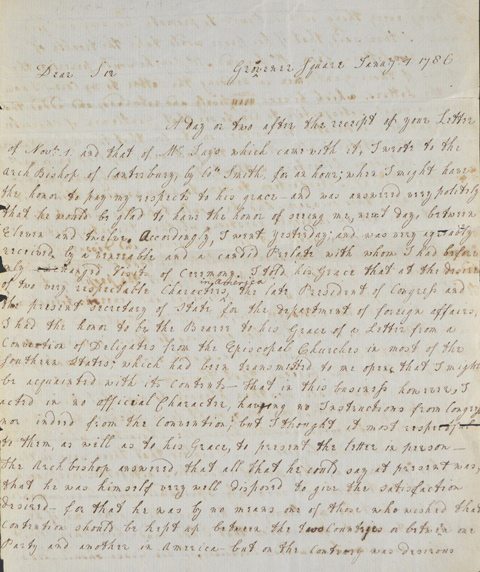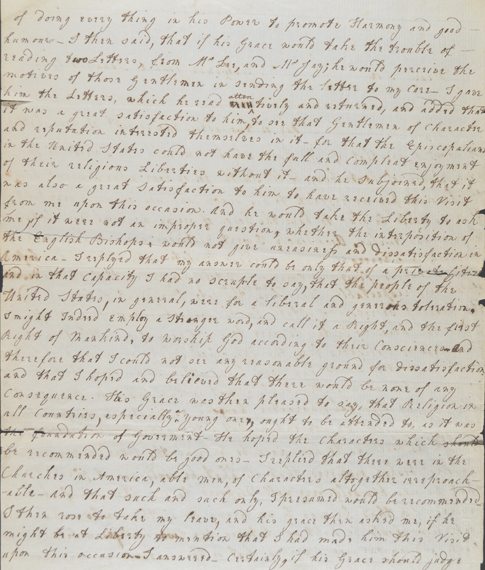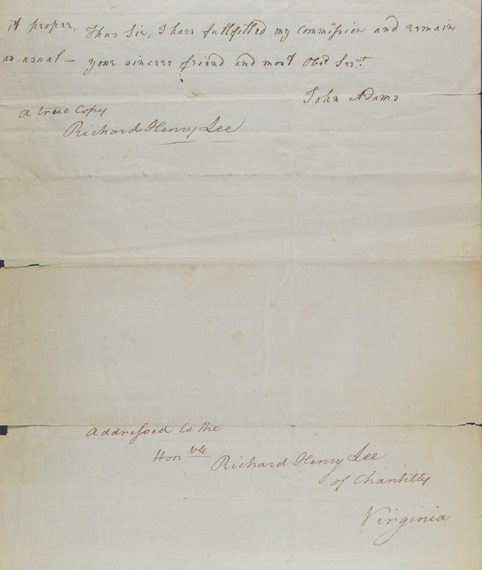While serving as President of the Continental Congress in 1785, Richard Henry Lee wrote to John Adams, who was serving as ambassador to England, urging him to assure the Archbishop of Canterbury that Episcopalian Americans were not resistant to bishops appointed from England. This letter was enclosed with a letter sent by John Jay on November 1, 1785. On January 4, 1786, John Adams replied to John Jay with the account of his meeting with the Archbishop.
WallBuilders has Richard Henry Lee’s handwritten copy of John Adams’ January 4, 1786 letter. The below transcript has paragraph breaks added in for easier readability.



Grosvenor Square Januy. 4 1786
Dear Sir,
A day or two after the receipt of your letter of Novb. 1, and that of Mr. Lee’s which came with it, I wrote to the Archbishop of Canterbury, by Col. Smith, for an hour; when I might have the honor to pay my respects to his Grace – and was answered very politely that he would be glad to have the honor of seeing me, next day, between eleven and twelve. Accordingly, I went yesterday, and was very agreeably received by a venerable and a candid Prelate with whom I had before only exchanged visits of ceremony.
I told his Grace that at the desire of two very respectable characters in America, the late President of Congress and the present secretary of State for the department of foreign affairs, I had the honor to be the bearer to his Grace of a letter from a convention of delegates from the Episcopal Churches in most of the southern States; which had been transmitted to me open that I might be acquainted with its contents. – That in this business however, I acted in no official character, having no instructions from Congress nor indeed from the convention; but I thought it most respectful to them, as well as to his Grace, to present the letter in person. The Archbishop answered that all that he could say at present was, that he was himself very well disposed to give the satisfaction desired – for that he was by no means one of those who wished that contention should be kept up between the two countries or between one party and another in America – but on the contrary was desirous of doing every thing in his power to promote harmony and good humour.
I then said, that if his Grace would take the trouble of reading two letters, from Mr. Lee, and Mr. Jay; he would perceive the motives of those gentlemen in sending the letter to my care. – I gave him the letters, which he read attentively and returned, and added that it was a great satisfaction to him, to see that gentlemen of character and reputation interested themselves in it – for that the Episcopalians in the United States could not have the full and complete enjoyment of their religious liberties without it – and he subjoined, that it was also a great satisfaction to him to have received this visit from me upon this occasion and he would take the liberty to ask me, if it were not an improper question, whether the interposition of the English Bishops, would not give uneasiness and dissatisfaction in America. – I replied that my answer could be only that of a private citizen and in that capacity I had no scruple to say, that the people of the United States, in general, were for a liberal and generous toleration. I might indeed employ a stronger word, and call it a right, and the first right of mankind, to worship God according to their consciences – and therefore that I could not see any reasonable ground for dissatisfaction, and that I hoped and believed that there would be none of any consequence. His Grace was then pleased to say, that religion in all countries, especially a young one, ought to be attended to, as it was the foundation of government. – He hoped the characters which should be recommended would be good ones. – I replied that there were in the churches in America, able men of characters altogether irreproachable, and that such and such only, I presumed would be recommended.
I then rose to take my leave, and his Grace then asked me, if he might be at liberty to mention that I had made him this visit upon this occasion. I answered, certainly, if his Grace should judge it proper.
Thus, sir, I have fulfilled my commission, and remain as usual – your sincere friend and most obed servt.
John Adams.
A true copy
Richard Henry Lee.
Still looking for answers? Visit our FAQ page
More Resources
Know the Truth and Protect Your Freedoms.
Still looking for answers? Visit our FAQ page
Stay Informed with the Latest Resources
Enter your email address to receive our regular newsletter, with important information and updates right in your inbox!










